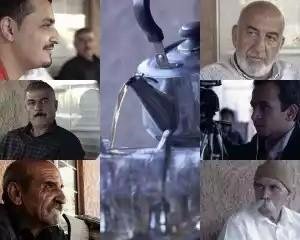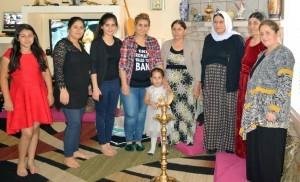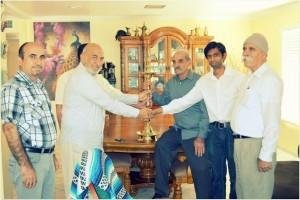HOLLYWOOD DIRECTOR ADITYA PATWARDHAN JOURNEYS INTO THE LIVES OF FORGOTTEN YEZIDIS
EASTERN SHORES OF THE WESTERN WORLD – THE MIDDLE EAST EXPERIENCE 
In the continuation to the shoot for my documentary called “Eastern Shores of the Western World” in association with I.C.C.S., last week I was introduced to one of the most kindhearted, blissful and courageous people that I have known – The Yezidis.
On the 19th of April 2017 I was attending Ser-Saal, the Yezidi New Year at their community event in Phoenix, Arizona. Persecuted by ISIS since 2014, the Yezidis claim that this is their 74th genocide, having been victims of religious oppression from one empire after another, all because they didn’t belong to the popular “Religion” of the region.
Regardless to say is the work done for their community by the people from SEWA International, HSS, and ICCS. Every praise falls short when I look at the selfless way these organizations have worked for the Yezidi community. Right from giving them the basic moral support, helping the Yezidis in retaining their identity and to teaching them organizational skills that can help them rebuild their community, Seva and others have been on the forefront of these activities.
Through my association with Sewa and HSS, when I arrived in Arizona, I didn’t know what to expect. I was going to meet members of an ancient community, who were new to the western world, far away from their homeland and not knowing when and how they would ever go back. Some had come to the United States more than a decade ago, some had arrived within the last three or four years, some had their sons and daughters living as refugees in Germany, Turkey, and other countries, some had relatives still in Syria & Iraq, and some didn’t even know where their friends and family were.
I arrived with a lot of preconceptions in my mind, anticipating an experience alien to me. And then when I met them, it all melted away. I saw the most courteous and gentle people, welcoming me into their house and family as one of their own. I knew that there had to be a shadow of their painful past somewhere, but it was nowhere to be seen. I was hidden probably, behind the force of their resilience and courage.
Yezidi as a community has faced one of the harshest of times, in one of the most hostile environments. They lived as a minority for more than a millennium and yet survived, not losing their identity to the dominant forces that surrounded them. And yet here they were, far away from their homeland, on the edge of the western hemisphere, maintaining their cultures with the same zeal and optimism as they might have done a millennium ago.
I shared meals, talks and some excellent Mesopotamian tea with them. I spoke to their Elders at length, the one who were the expert on the Yezidi religion, and they told me about their culture, rituals, and roots. In happier times, that conversation could have happened by a fireside, somewhere in northern Iraq, but alas here I was, in central Arizona, talking about the pre-Islamic middle-eastern faith systems.
Behind their calm exteriors was their strength and resilience that they had built over the centuries. And behind that was the wisdom of their faith and the Yezidi way of life – A sophisticated lifestyle that had survived its dogmatic and violent surroundings… A system based on astronomy and zodiac… a system very much similar to the Vedic way of life.
Saving Yezidis as a people, which is the most important task at hand, might be a complex maneuver. There is the middle-eastern geopolitics, the Arabs and the Kurds, the Europeans and the Americans, the Christians and the Muslims, the NATO and the Russians and so on… but saving Yezidi as a culture is something of importance as well and it is a task that the people from Vedic civilization can accomplish with their present tools.
Yezidi is a pre-Islamic Mesopotamisn/Anatolian (Iraq, Syria, and Turkey) faith system which shares its roots or probably has its origins in the Vedic culture of the Indo-Aryans. From their calendar, festivals, their deity Melek-Taus (the Vedic ‘Dhyo‘?) and their idea of non-violence, we can see that they share their journey with that of the Indic civilizations.
Once a prominent sophisticated culture in the times of the Mittani empire, the Yezidis in the modern Islamic times is a culture on way to its extinction. As they migrate further out of their homeland, they lose the connection to their original philosophy, which has already undergone fatal modifications due to the surrounding influence. I believe, and the Yezidi elders agree with this, that the answers to the questions about the Yezidis lie with the Vedic civilization and for this, they look towards it with hope.
A small moving excerpt:
I asked, “What can India do for Yezidis as a culture?”. The Yezidi Elder smiled and replied, “You have a place for 99% of the world religions, why not give us the remaining 1%”. As realization sunk in, I said, “Sir, you already are a part of the 99%, just that neither I nor you are aware of it”
The Vedic way of life lost itself to dogma in Europe, Middle-east, Afghanistan and Central Asia. The Yezidi is a fading living footprint that it has in the middle east and needs to be saved. Primarily as a people and then also as a living culture. A research facility for the Yezidis, a temple for Melek Taus or even a place for their priests at Hindu temples would only add to the wide galaxy of the vibrant Vedic civilization.
Since 2015 I have been working on the documentary “Eastern shores of the Western World”. I filmed with the Romuva Pagans of the Baltic, the Szekely community of the Black Sea region and lastly the Yezidi community of Middle East. The Romuva is a revival movement that seeks to follow the pre-Christian faith of the Baltic region. The Szekely is an extinct religion whose traces are now seen in the modern day Christian rituals in central Asia and black sea region. The Yezidi are an ancient live faith, ongoing in their struggle to avoid extinction, both of its people and of its culture.
But they all have some particular things in common. They all refuse to believe in the dogmatic idea of “Religion”, they all believe that they once were a “Live Faith” or “Dharma” that was derived out of astronomy and life sciences and lastly, they all acknowledge that the answer to their origin is somewhere in the Vedic civilization.
With this I conclude, praying that peace and a “Home” can soon be restored to the Yezidis and I can, with film and media as an equipment, play a part in helping them rebuild what was lost.


About the author:
Based in Los Angeles, Aditya Patwardhan is a Hollywood filmmaker. He is best known for his short film Red House by the Crossroads for which he won Best Short film Award at the Los Angeles Independent Film Festival Awards and the film was also the part of the Cannes Film Festival 2015. His popular music video “Katra Katra” is currently playing on MTV India in the Indie Pop category on national television in India. He can be reached at [email protected]